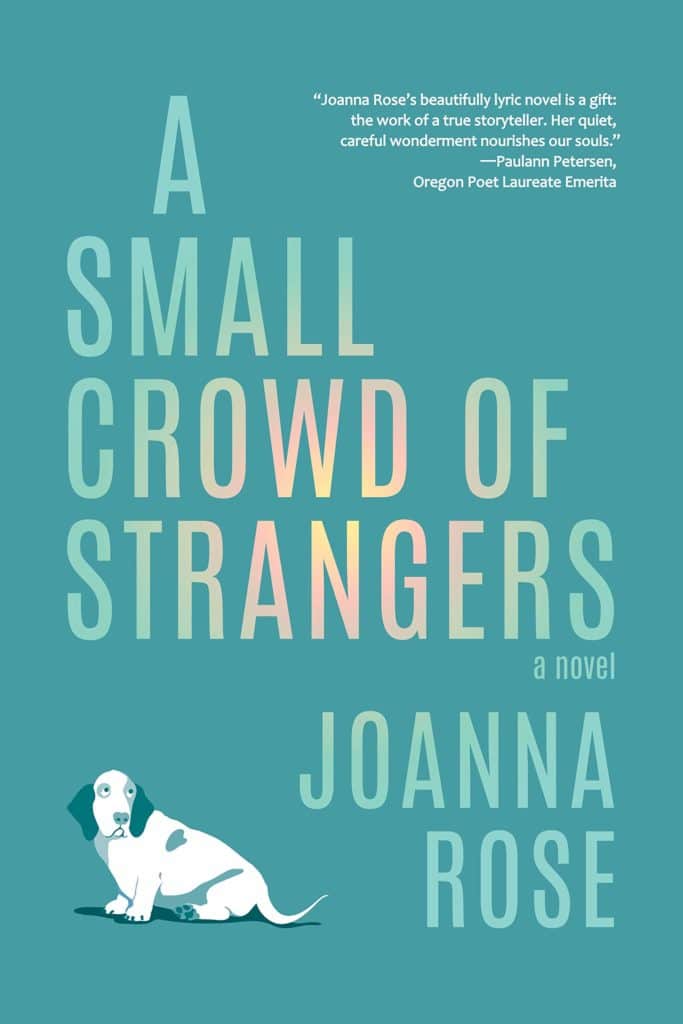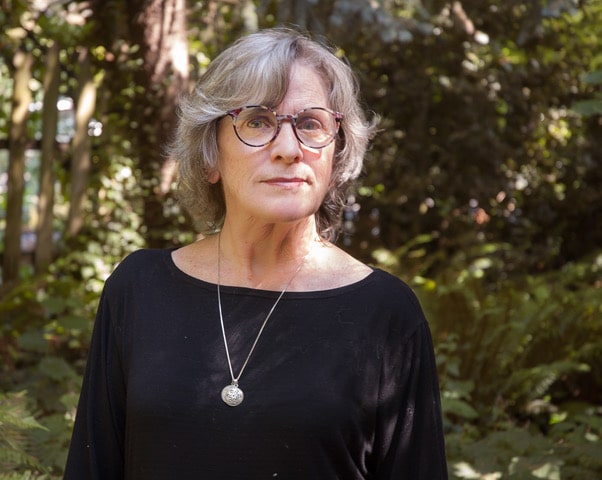Writers in the Schools (WITS) Program Specialist Joanna Rose has served high school students through Literary Arts for almost two decades. She is retiring this month to focus on her career as a novelist and teacher. Joanna has been an integral part of the WITS program and community, and will be sorely missed. This week, Jules Ohman, WITS Program Specialist, interviewed Joanna about her new novel, A Small Crowd of Strangers, out September 12th from Forest Avenue Press.
Jules Ohman: How has your work with Literary Arts evolved over the last two decades?
Joanna Rose: My role at Literary Arts has been long and varied. I started nineteen years ago as a writer in the classroom, and proceeded from there to working with other writers in the classroom, showing them what I had learned about working with high school students, which is a lot different than the basic pedagogy of teaching writing. From there, I took on an official role as a Program Specialist. I worked with this amazing teaching artist once, he was a banjo teacher. What he said to me that made so much sense to me was, “Public school is not for everyone, yet here we all are.” That’s really where you have to start.
JO: Your new novel, A Small Crowd of Strangers, comes out on September 12th. What ground does the novel cover, or, more specifically, when people out in the world ask you what it is about, what do you tell them?
JR: It’s essentially about a woman who moves through the world without really paying attention. She makes a lot of serious mistakes by not paying attention, and what she comes to understand is all because of those mistakes. Pattianne gets mixed up in all the problems of humanity. She gets involved with the wrong man and marries him. She ponders a lot about faith. It’s about relationships, family, and religion. A big central part of the novel is that she doesn’t want to have kids. Reproductive rights come into it. She’s the kind of person who keeps leaving, rather than staying and learning from her mistakes, which makes it a part roadtrip story. It’s about the larger community and what we can take in from them.

JO: A lot of people are adrift and struggling to find community right now, since we can’t all be together, and high school students in particular are not able to participate in sports or activities that would normally draw them into a community. Do you have guidance for them in finding community?
JR: I came of age in the sixties, when it was very much a part of the national conversation that we find our own family and develop our own families. There were a lot of people like me who were leaving families behind to find ourselves in communities with like-minded people, which is a long way of saying hippies. What I’ve observed over the last fifty years is people that successfully form communities pay attention to what they love. I loved language and poetry and art and I found myself attracted to those people without being aware of it.
“What I’ve observed over the last fifty years is people that successfully form communities pay attention to what they love.”

JO: Does your central character, Pattianne, have something that she loves, or serves as a unifying force for her community?
JR: Not necessarily. What she loves is viewing people from a bit of a distance; she finds them fascinating. She ends up with a group of likeminded people that all come together on this island community that don’t have any connected roots. For her, and for me, it was the result of wandering around wide-eyed to find what we love. I don’t recommend it as a way to go about that. It was certainly that way with Writers in the Schools. It was a few years before I understood how much those little communities full of teenagers meant to me. How much I could love them and enjoy them from that distance.
JO: Do you think that distance, the ability to observe, is inherently linked to writing or writers?
JR: I know writers who are all kinds of people, but we do get to know each other through our writing, which is an interesting kind of remove.
JO: What was your revision process like with A Small Crowd of Strangers?
JR: It was crazy. First, I wrote it as a frame novel. She starts on the island and looks back at the deeds that got her there. My editor at the time didn’t feel that worked. Frame novels are difficult. I worked and worked at that. After a year, I decided to put it in chronological order. And it changed it a lot. Then I decided to try it in third person. I had quit sending it out, and got stuck messing around with it. A dangerous place for a writer. When it was in third person, I was amazed by how it changed the tone of the book. Humor entered the story. I made it funnier. Then I added the other point of view (of Patianne’s husband). This was over a twenty year period.
JO: What year did you ultimately decide to set it in?
JR: 2005. The time markers kept changing. When did she get a cell phone? When did she access the internet? I finally had to pick a year. I wanted it to be after September 11th. I wanted it to be well before everyone had cell phones, because that’s a whole different kind of storytelling. Where in time you set a novel is huge. On a small level, I had to go in and figure out when people started getting personalized ring tones. It was really hard to find out, and I don’t think I got it right.
JO: In 2005, a friend of mine had a personalized Justin Timberlake ringtone on her flip phone. So I think you’re good.
JR: Great. I’ll check that off my list.
JO: Rest assured. What’s your biggest piece of advice to students?
JR: My first impulse is to say read, keep reading. But I think it’s to pay attention to something. You want to say to everyone: Pay attention. But that’s too big a request. But to invite people, especially young people, to pay attention to something. When we pay attention to one thing, it’ll lead to other things. If we pay attention, we’ll find out what we love.
You can preorder A Small Crowd of Strangers by Joanna Rose at Broadway Books┃Powell’s Books┃Annie Bloom’s Books┃


